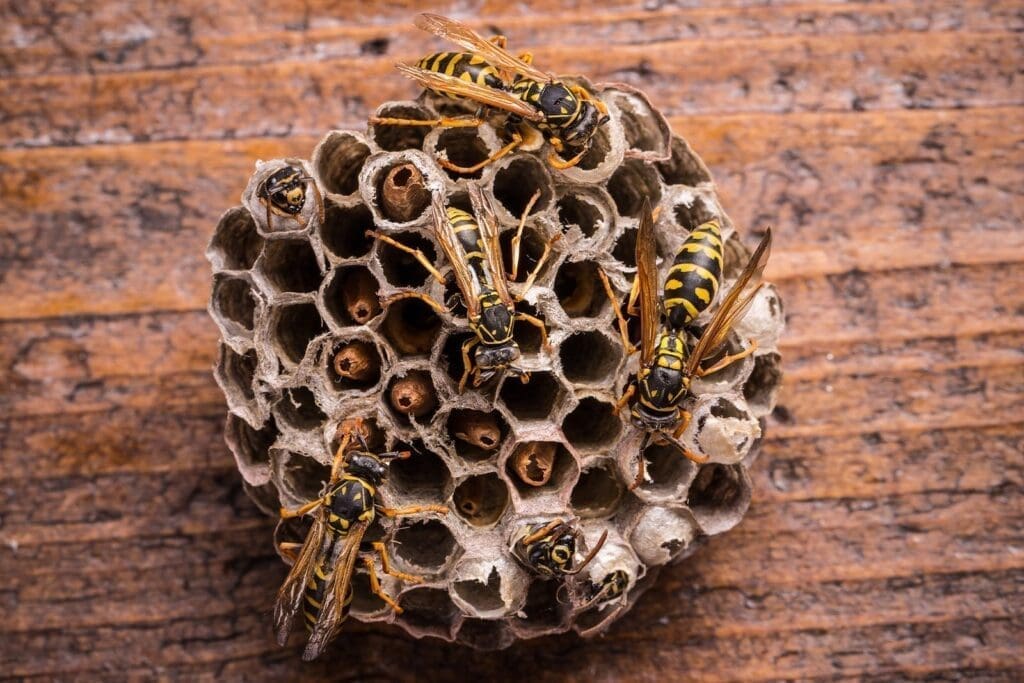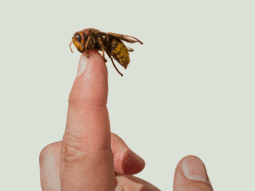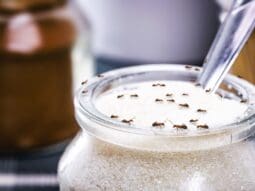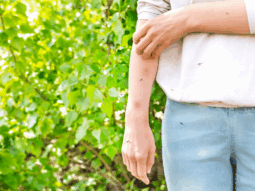
Wasps That Invade Texas Homes
When we think of household pests, the first creatures that come to mind typically include mosquitoes, flies, ants, cockroaches, and spiders. It usually takes people a while to mention wasps, and many do not even think about them when naming household pests.
The lack of attention directed towards wasps could be related to unfamiliarity. Many people are unaware of the threats that wasps present. They may also not know what specific wasps are living in their area.
Securing your Texas home requires protecting it against all kinds of pests. Take this opportunity to learn more about the wasps that reside in Texas and figure out the best way to deal with them.
What Are Wasps?
Before we start discussing specific types of wasps, let’s first discuss them from a more general perspective.
Wasps are insects that belong to the order Hymenoptera and the suborder Apocrita. There are thousands of wasp species that are currently known. You may be encountering all kinds of wasps regularly without knowing it.
When wasps are still in their larval stage, they subsist mainly on insects. After they emerge from their pupas and become adults, wasps change their diet. They make the transition from eating insects to mainly consuming nectar.
Their preference for nectar helps explain why wasps often get confused with bees. It does not help that wasps are quite similar to bees in appearance. Their color patterns are especially similar.
Wasps generally fall into one of two categories:
One category features the highly organized, social wasps, which form large colonies they hide from view.
The other category features solitary wasps. Solitary wasps live in considerably smaller nests. More often than not, those nests are underground. Those nests can be difficult to spot even if you have a general idea of what you are looking for.
Why Should You Be Worried about Wasps?
Many homeowners do not see wasps as pests because they do not fully grasp the threats these insects pose. You may be surprised to learn about the potential havoc that wasps can wreak. In many ways, they are more threatening than some of the common household pests that people fear.
This section of the article will highlight the reasons you should be wary of wasps. Evaluate the threat they present before you decide how you want to handle them.
Wasps Are Venomous Insects
First off, you should pay attention to wasps around your home because those insects are venomous.
This Texas A&M University article notes that wasp venom can cause intense pain and swelling.
If a wasp stung you, consider yourself lucky if those are the only issues you experienced.
Some wasp stings can be especially dangerous if they are near the eyes or the neck area. Wasp stings can also be life-threatening to people allergic to that insect’s venom.
Although people dying from wasp stings is rare, you should still acknowledge it as something that could happen if someone in your household has serious allergies.
You must remove the wasps on your property to eliminate that possibility.
Wasps Are Aggressive
Wasps are more aggressive compared to bees. Part of that is because they are hunters. They need to find insects to feed their young, and they will not shy away from attacking to get what they need.
Social wasps are also dangerous because of how territorial they are. If you accidentally stumble upon a nest of social wasps, you can expect them to attack immediately. They will also aim for your head, so you must protect yourself properly.
Wasps Will Eat Your Plants
We cannot deny the environmental impact of wasps. They help balance the ecosystem by feeding on their fellow insects. Backyards swarming with insects may even benefit from the addition of wasps.
Wasps would be less problematic if they only dined on insects. Unfortunately, that is not the case.
As they enter adulthood, wasps will turn their attention to other types of food. They like eating nectar but do not turn down fruits and plants.
Some wasps are even known to eat human food. That is why they have a reputation for ruining picnics.
Wasps do not damage gardens as much as other more notorious pests do, but they still present a threat. To keep your garden in prime condition, you must also keep it safe from wasps.
Wasps Can Damage Your Home
Termites, ants, and beetles are some of the pests best known for damaging homes. However, they are not the only pests capable of posing that threat. Wasps also possess that particular ability.
According to this article from Clemson University, some wasps are known to scrape wood and use the shavings to build their nests. If you happen to live near a colony of wasps, you can imagine the collective damage they can do to your home.
Wasps will not compromise the structural integrity of your home, but they can affect its appearance. You probably do not want those pests redesigning your home.
Get rid of them as soon as possible to prevent that from happening.
What Kinds of Wasps Live in Texas?
Now that we know more about wasps and the dangers they present, we can narrow our focus and highlight the specific issues that you may be dealing with. Different kinds of wasps live in different areas of the country.
Texas residents should be concerned with two particular types of wasps.
Paper Wasps
Paper wasps are frequently found in the Lone Star State. You can tell that you are dealing with a paper wasp by looking at its appearance.
Typically, these insects have brown bodies with yellow markings. Paper wasps also have slim bodies and long legs. Those long legs are easy to notice when paper wasps are moving around.
The paper wasps that live in Texas can be dangerous because they are social wasps. They will fight relentlessly upon sensing a threat to their nest.
Do not be surprised if you find paper wasps hanging around your backyard garden. In all likelihood, they are looking for food there. Shooing them away may be necessary if they are starting to go after your fruits.
Where Do Paper Wasps Live?
You may already suspect that paper wasps are invading your home. So, where should you go in search of them?
While outside, you should first check any overhangs around your home. The paper wasps may have already used the wood shavings they gathered to build nests in those spots.
Paper wasps may also build nests inside attics and garages. They can also make use of exposed beams to create their nests.
You can tell you have paper wasps inside your home if you spot umbrella-shaped nests.
Notably, paper wasp nests are typically quite small even though they are social insects. Per this article from the University of Minnesota, paper wasp nests usually house fewer than a dozen wasps. Even the larger nests may not hold more than 100 paper wasps.
Paper wasp nests being so small can be somewhat of a double-edged sword. On one hand, small nests are easier to remove. On the other hand, finding those small nests can be a real challenge.
Feel free to enlist the help of professionals if you are having trouble with paper wasp nest removal.
Yellowjackets
The other type of wasp that Texas homeowners should keep an eye out for is the yellow-jacket.
Yellowjackets are slightly smaller than paper wasps. They also lack the long legs that paper wasps are known for.
These insects usually have black bodies that almost appear shiny when viewed up close. Their black bodies also have yellow stripes and spots.
You are more likely to encounter yellowjackets compared to paper wasps. That is because yellowjackets are more aggressive when it comes to securing food. They will fly around your food in search of a few nibbles, even if you are nearby.
Deal with yellowjackets carefully when they are nearby because they are still social wasps that can present a significant danger to people. Yellowjackets appear in larger numbers right around the start of the fall season. Exercise more caution then so you do not get caught up in a swarm of yellowjackets.
Where Do Yellowjackets Live?
The chances of finding a yellowjacket nest inside your home are relatively low because they do not prefer staying indoors. They will only build nests indoors if there are small openings available for them. Otherwise, they would rather stay outdoors.
Does that mean yellowjackets will not threaten your home? That is not the case either.
These insects will build their nests in the ground. They will use holes left behind by other animals and convert them into nests. Yellowjackets may also live inside any hollow logs lying around your property.
Yellowjacket nests are considerably larger than paper wasp nests. They need to be big because they routinely house thousands of yellow jackets. You are likely dealing with a major infestation if you find a nest close to your home.
It is also worth mentioning that yellowjackets do not reuse their nests. If you passed up an opportunity to remove one previously, you need to find their new nest all over again.
How Do You Get Rid of Wasps in Texas?
Paper wasps and yellowjackets pester Texas households regularly. You may have plenty of experience struggling with those pests and have thus far failed to come up with a way to get rid of them permanently.
Do not let the wasps take over your property. Aside from making your home less accommodating, you should also seek to eliminate wasps because their presence can negatively affect property value.
Thankfully, there are things you can do to fight back against those pests. Detailed below are steps you can take if you wish to free your household from a wasp infestation.
Maintain Your Yard
Yard maintenance will be crucial if you have wasps nearby. Pay more attention to that aspect of caring for your home if you want to minimize your wasp problem.
Start by looking over your yard. Inspect the ground for any openings your pets or stray animals may have created.
Cover holes if you do find them. Do not only use leaves to cover them up as well. You should fill those holes with dirt to become unusable to wasps.
In addition to filling the openings you find; you should also remove random fruits and plants that are scattered all over your yard. Pick them up and dispose of them carefully. Place the fruits and plants inside a container that you can seal tightly so the wasps can no longer get to them.
You also need to adopt a more involved yard maintenance routine if you are aiming to drive the wasps away. Clean up regularly so your yard becomes unattractive to those flying pests.
Be More Selective with Your Plants
Adult wasps like dining on fruits and plants, but they will not eat everything. By carefully choosing the plants you are growing in your backyard, you can effectively prevent wasps from taking over it.
To discourage wasps from treating your garden like a buffet, consider avoiding flowers and budding plants. You should also avoid fruits if you want to stop the wasps from inviting themselves over constantly.
Of course, not everyone is keen on the idea of growing a garden with restrictions like that. If you do not want to restrict yourself, you can also try growing plants that will repel the wasps.
Examples of plants that wasps dislike include spearmint and thyme. Those can be excellent additions to your garden because they have household uses as well. Position those plants next to the ones that wasps like so they become more hesitant to feast on your garden.
Avoid Leaving Food Outdoors
Eating outside on your patio is a nice summer treat. Or at least it should be. Sadly, wasps can ruin that experience for you.
Wasps may bug you constantly while you are trying to enjoy your meal. Yellowjackets, in particular, are more likely to hang out when there is food around.
If you want to encourage wasps to leave your property, you should temporarily stop outdoor dining. Even if you manage to shoo the wasps away while you are eating, they may come back later to dine on any crumbs that fell from your plate. It would be better to eat indoors to prevent that problem.
The indoor dining rule should also apply to your pets. Feed your pet indoors while the wasps are still nearby. Your pets probably will not enjoy being interrupted by the wasps either, so keep them indoors where they can eat in peace.
Seal Openings Leading into Your Home
If you follow the tips detailed above, you can deprive the wasps of easily accessible food. However, that may not be enough to drive them away for good. Instead, they may turn your attention to your home in search of food.
The wasps will look for small openings along doors and windows to enter your home. Once inside, they will scavenge for food. They can also cause all kinds of problems while they are inside your home.
You need to stop them from entering your residence. Inspect the sides of your doors and windows for openings and seal any that you find. Check out your walls because there may be openings the wasps can use.
Once you deprive the wasps of all available food sources, they should move away from your Texas home.
Spray the Wasp Nest with Soap and Water
A simple mixture of dish soap and water may be potent enough to kill wasps. Get a spray bottle, then combine the dish soap and water. Shake it to mix the two substances properly.
Before approaching the nest, wear protective clothing for your extremities and your face. Do not approach the nest if you do not have any protective clothing available.
You should also stick to spraying small nests. Avoid spraying a large nest because the agitated wasps can easily overwhelm you.
Try to do this either early in the morning or late at night so you can catch the wasps off guard.
Wasps tend to be inactive during those times, so you can get to them better.
Leave the area immediately after spraying the wasp net. Do not give them a chance to retaliate following your attack.
Hire Pest Control Professionals
Remember that hiring pest control professionals is always an option if you want to free your home from wasps. If you have allergies or a large wasp nest, hiring pest control professionals should be something you strongly consider.
Some homeowners are hesitant to hire pest control experts because they do not like their methods. You should know that some services approach pest removal in an eco-friendly way.
Work with them if you want the best type of pest control for your Texas home.
What Attracts Wasps to My House?
Similar to many other pests, wasps become driven by their survival instincts. They need shelter and food to survive, and they will look for those things wherever they can get them.
If you find that wasps seem to hang around your Texas home regularly, then that is likely because your property is a great source of food and shelter for them.
Remember that wasps can take up shelter in most openings. You may be inviting them onto your property because you have appealing shelter locations. Even rarely used areas inside your home can be attractive nesting areas for wasps.
You can only remove wasps from your property if you do something about those potential nesting spots.
When it comes to food, we have already outlined some of the things you can do to make food sources inaccessible to wasps. By regularly cleaning your yard, choosing plants carefully, and only eating indoors, you can avoid leaving any treats behind for your unwanted guests.
The wasps may still feed on some of the other insects crawling around your yard, but you may be okay with that.
Cutting off the wasps’ access to food and shelter will be key to removing them from your property. You can go about completing that task on your own, or you can work with pest control professionals to make it more manageable.
Do Wasps Sting in Texas?
We’ve established in this article that wasp stings could be potentially dangerous and even life-threatening. You need to avoid those stings at all costs.
So, how likely is it that the wasps will attack you?
The wasps in Texas are more likely to attack because they are social wasps. They will attack fiercely when provoked.
Crucially, wasps are not that easy to provoke. They will only respond to your actions with hostility if you demonstrate that you are a threat to their nest. As long as you steer clear of the nest, they should not attack you. The wasps will still pester your home, but they will not sting you or your family.
If you ever have wasps attacking you, your priority should be to cover up. Place your hands over your head so the wasps cannot sting you in a dangerous spot. After that, you should head indoors right away.
The worst thing you can do is to stand in the same spot because you cannot win against a nest's worth of wasps. Retreat for now and try to eliminate the wasps later.
Seek professional assistance if you are dealing with a major wasp infestation. Reach out to us at Romex Pest Control if you are a Texas resident looking for an eco-friendly way to remove wasps from your property. We are also ready to help any Louisiana, Mississippi, or Oklahoma-based residents dealing with that same problem.
We hope you enjoy these informational articles. If you'd like to learn more about our eco-friendly pest control services, call (844) 955-2447.
Read More
Your Path to a Pest-Free Home or Business
Romex Pest Control
We are committed to protecting you, your children, and your pets with our eco-friendly, child-friendly, and pet-friendly guaranteed pest control solutions.
Romex Pest Control is fully insured and licensed in Texas, Oklahoma, Louisiana, and Mississippi.
Service Areas:
Hours
M-F 8 am–5 pm
Sat 8 am–2 pm
Sun Closed
Established 2016 © Copyright 2025 Romex Pest Control










